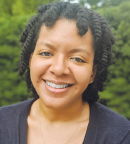
Christina Best
Two years ago, when I began having pain and bloody discharge in my left breast, I thought it was the return of a solitary intraductal papilloma I had had in that breast when I was a college student 6 years earlier, so the symptoms didn’t initially alarm me. It wasn’t until I noticed that the mass I had been feeling in my breast had grown substantially in just a couple of months that I became concerned. Still, at age 24—and now in graduate school—I wasn’t thinking the problem could be cancer. Even my doctor seemed unconcerned when I saw her for an examination, and she assured me that the tissue biopsy and ultrasound she was recommending were routine procedures to rule out anything serious. There was no need to worry, she assured me, after all, I was too young for cancer. Although I continued to research the possible causes of my health issues, I kept reminding myself that the problem was probably not serious.
So, when I went for a follow-up visit a couple of weeks later, I was shocked to hear I had estrogen receptor–positive invasive ductal carcinoma. A second biopsy later confirmed that my cancer was borderline stage IIb.
The news sent me reeling, and it was difficult to concentrate on what she was saying about what I needed to do next, including meeting with medical, surgical, and radiation oncologists to learn about treatment options, as well as a fertility specialist to take steps to protect my fertility after chemotherapy. The whole conversation was so surreal it felt like I was watching a movie of someone else’s life.
Going for the Cure
FOLLOWING MEETINGS with my various oncologists, it was determined that I would need a lumpectomy to remove the rest of the cancerous mass and adjuvant chemotherapy—the dreaded Red Devil doxorubicin—followed by radiation. Because the amount of tissue that would have to be removed during the lumpectomy was going to add to the already substantial amount that had been taken for two tissue biopsies and leave my breasts noticeably asymmetrical as well as the possibility that the cancer could recur in my right breast, I opted for a contralateral prophylactic mastectomy and breast reconstruction.
The treatments I’ve had make me confident that my cancer has been cured, and I’ve resumed my full-time studies in graduate school. And despite having to miss out on some promising career opportunities during my treatment and recovery, the experience of having cancer has made me reevaluate my career goals in secondary education and is leading me to pursue a career in education technology and consulting. Before my diagnosis, I was following a career path of school administration, with the belief that it made the most sense for me. However, I’ve since realized that it is important to take risks, to use my time wisely, and to pursue my dreams; my greatest one is working in the field of education technology.
“Although I know that cancer is now an indelible part of my life and history, I’m not letting it deter me from fulfilling my professional and personal goals.”— Christina Best
Tweet this quote
What has really changed my life is my newfound connection with my maternal grandmother, who was diagnosed with breast cancer in the early 1990s, when she was in her 60s and didn’t expect to live long. Now, nearly 30 years later, she remains cancer-free and healthy. She has become a role model for me, and my relationship with her has grown from simply grandmother and granddaughter to co-survivors of breast cancer.
Finding New Direction
WHEN MY grandmother was diagnosed with breast cancer, it was still a disease talked about in whispers if at all. But my reaction was to blog about my cancer experience, and having that social media platform kept me connected to peers and feeling less isolated. I also found Teen Cancer America (teencanceramerica.org), an organization that partners with hospitals throughout the United States to develop specialized facilities and services for teens and young adults with cancer, which has given me the opportunity to meet other young cancer survivors who can relate to what I am experiencing and made me want to give back to that community and become an advocate for other young survivors.
I was also fortunate to have a caring medical team that always made me feel safe and loved. Whenever I was in the clinic for treatment or a follow-up visit, my oncologist never missed a chance to give me a hug and ask how I was doing. He was genuinely interested in knowing not just about my physical well-being, but about my emotional well-being as well, and I’ll never forget his kindness and thoughtfulness.
Looking to the Future
WHEN I WAS diagnosed with cancer in 2016, I felt left behind. My peers were moving on with their lives and careers, and I was stuck in my life trying to process what was happening to me.
Today, I’m looking to the future. I am back in graduate school and expect to graduate next spring. And although I know that cancer is now an indelible part of my life and history, I’m not letting it deter me from fulfilling my professional and personal goals.
I’m moving on. ■
Ms. Best lives in New York City.
Editor’s Note: Columns in the Patient’s Corner are based solely on information The ASCO Post received from the survivors interviewed and should be considered anecdotal.

